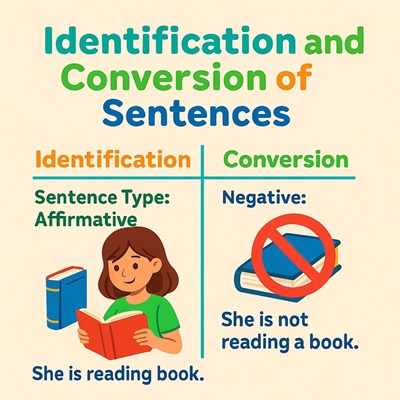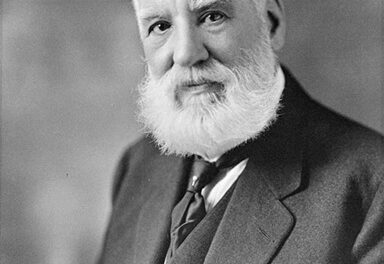What is a Sentence?
A sentence is a group of words that expresses a complete thought. Every sentence must have at least a subject (who or what the sentence is about) and a predicate (what the subject is doing or what is happening to the subject).
Example: The playful puppy chased its tail.
- Subject: The playful puppy
- Predicate: chased its tail
Types of Sentences
There are four main types of sentences in English. Each type has a specific purpose and ends with a particular punctuation mark.
1. Declarative Sentences
Declarative sentences make a statement or declaration. They provide information and always end with a period (.).
Examples:
- The sun rises in the east.
- My teacher assigned homework yesterday.
- Butterflies have colorful wings.
2. Interrogative Sentences
Interrogative sentences ask a question. They always end with a question mark (?).
Examples:
- Do you like chocolate ice cream?
- Where did you put my science book?
- Why does the moon change shape?
3. Imperative Sentences
Imperative sentences give a command, instruction, or request. They usually end with a period, but can sometimes end with an exclamation mark for emphasis.
Examples:
- Please close the door.
- Add two cups of flour to the mixture.
- Don’t forget to feed the fish!
Grammar Note: In imperative sentences, the subject “you” is often understood but not stated.
- (You) Take out the trash.
- (You) Turn to page 42 in your textbook.
4. Exclamatory Sentences
Exclamatory sentences express strong emotion or excitement. They always end with an exclamation mark (!).
Examples:
- What a beautiful sunset that is!
- I can’t believe we won the championship!
- How quickly the summer vacation passed!
Beyond the Basics: Special Sentence Types
Compound Sentences
A compound sentence contains two or more independent clauses (complete thoughts) joined by a coordinating conjunction (FANBOYS: for, and, nor, but, or, yet, so) with a comma, or by a semicolon.
Examples:
- The bell rang, and the students rushed out.
- It was raining hard; we decided to stay inside.
Complex Sentences
A complex sentence has one independent clause and at least one dependent clause (an incomplete thought that cannot stand alone).
Examples:
- Although it was raining, we still went to the park.
- When the bell rings, we will go to lunch.
Grammar Tip: The dependent clause often begins with words like after, although, as, because, before, if, since, though, unless, until, when, where, while.
Conditional Sentences
Conditional sentences express that the action in the main clause depends on the condition in the “if” clause.
Example: If it rains tomorrow, we will cancel the picnic.
Less Common Rules and Special Cases
1. Inverted Sentences
Most sentences follow the subject-verb order, but sometimes this order is inverted for effect or in questions.
Standard order: The bus arrives at noon. Inverted order: At noon arrives the bus.
Grammar Note: Inverted sentences often begin with place expressions (here, there, everywhere) or after certain adverbs.
- Here comes the parade!
- Never have I seen such a beautiful rainbow.
2. Incomplete Sentences or Fragments
While complete sentences are the rule, sometimes fragments (incomplete sentences) are used in creative writing or dialogue to create special effects.
Examples:
- “Coming soon!”
- “Just a minute.”
- “Because of the storm.”
Important Rule: In formal writing, always use complete sentences. Fragments are mainly for creative writing and dialogue.
3. Run-on Sentences
Run-on sentences occur when two or more independent clauses are incorrectly joined.
Incorrect (Run-on): The dog barked loudly the mailman walked away quickly.
Correct Versions:
- The dog barked loudly. The mailman walked away quickly.
- The dog barked loudly, and the mailman walked away quickly.
- The dog barked loudly; the mailman walked away quickly.
4. Elliptical Sentences
Elliptical sentences are grammatically incomplete but understandable because the missing words are implied by context.
Example: He can run faster than she [can run].
Tricky Examples and Exceptions
Tag Questions
Tag questions turn a statement into a question by adding a small question at the end.
Examples:
- You like pizza, don’t you?
- She hasn’t arrived yet, has she?
Grammar Rule: The tag uses the opposite form (positive/negative) of the main statement.
Negative Questions
Negative questions usually expect confirmation or express surprise.
Examples:
- Haven’t you finished your homework yet?
- Didn’t she tell you about the party?
Commands with Subjects
While most imperative sentences have an understood “you,” sometimes the subject is explicitly stated.
Examples:
- You try it first.
- Everybody stand up.
Remember!
- Every complete sentence must express a complete thought.
- The type of sentence determines its ending punctuation.
- In formal writing, avoid fragments and run-on sentences.
- Subject-verb agreement is essential in all sentences.

















